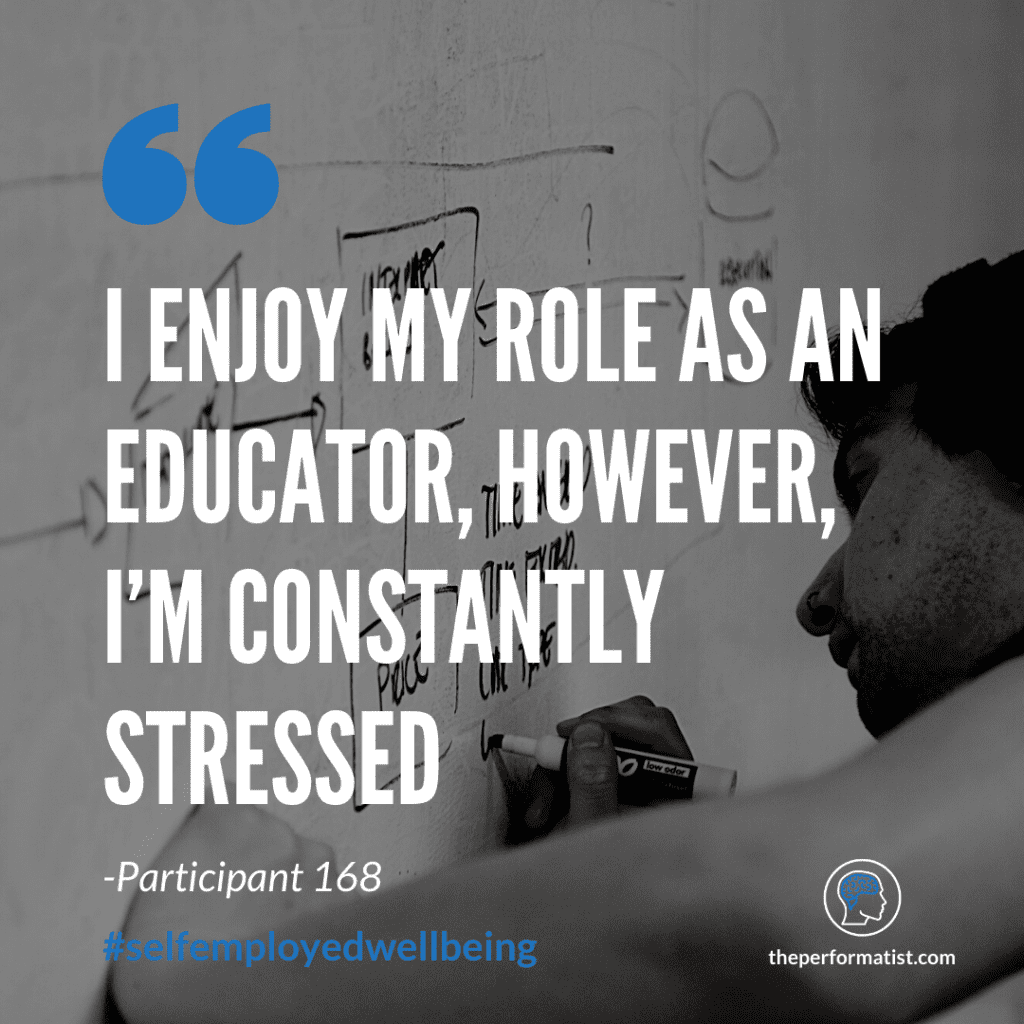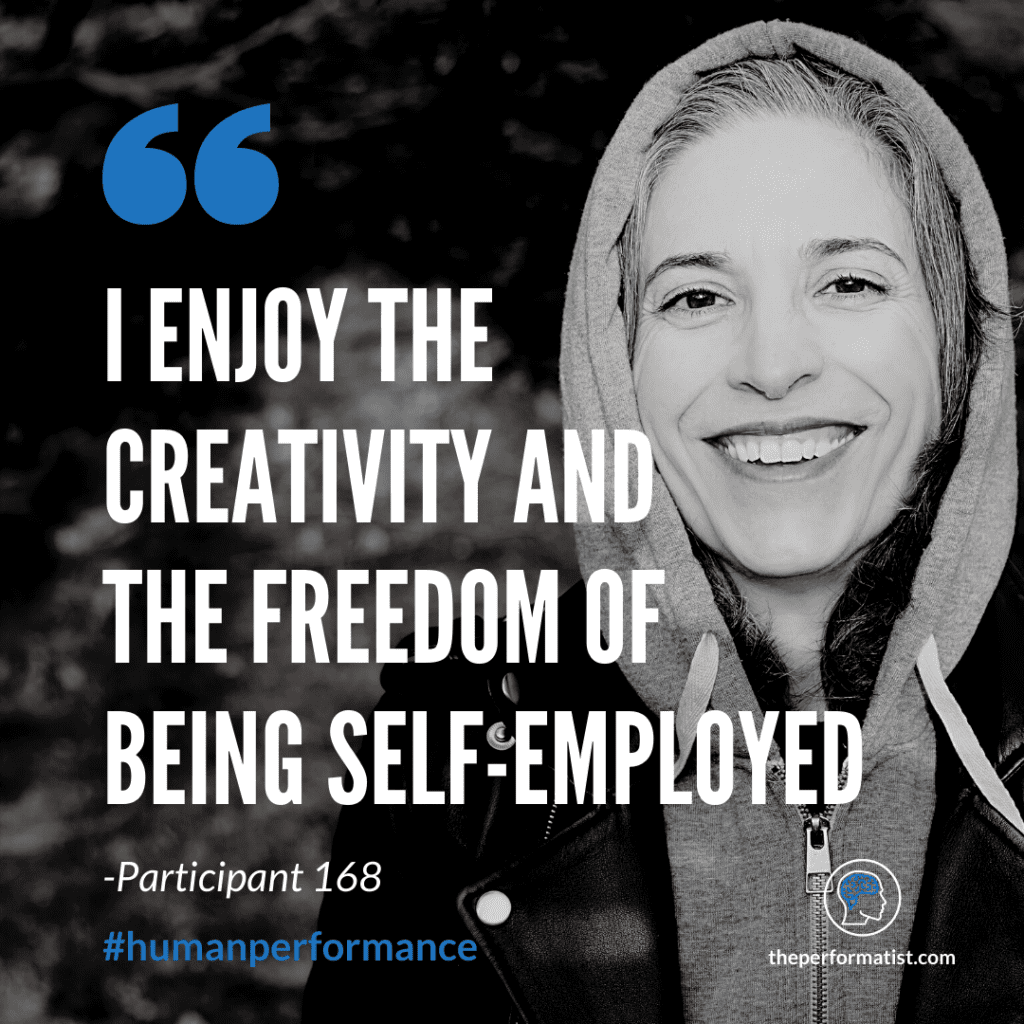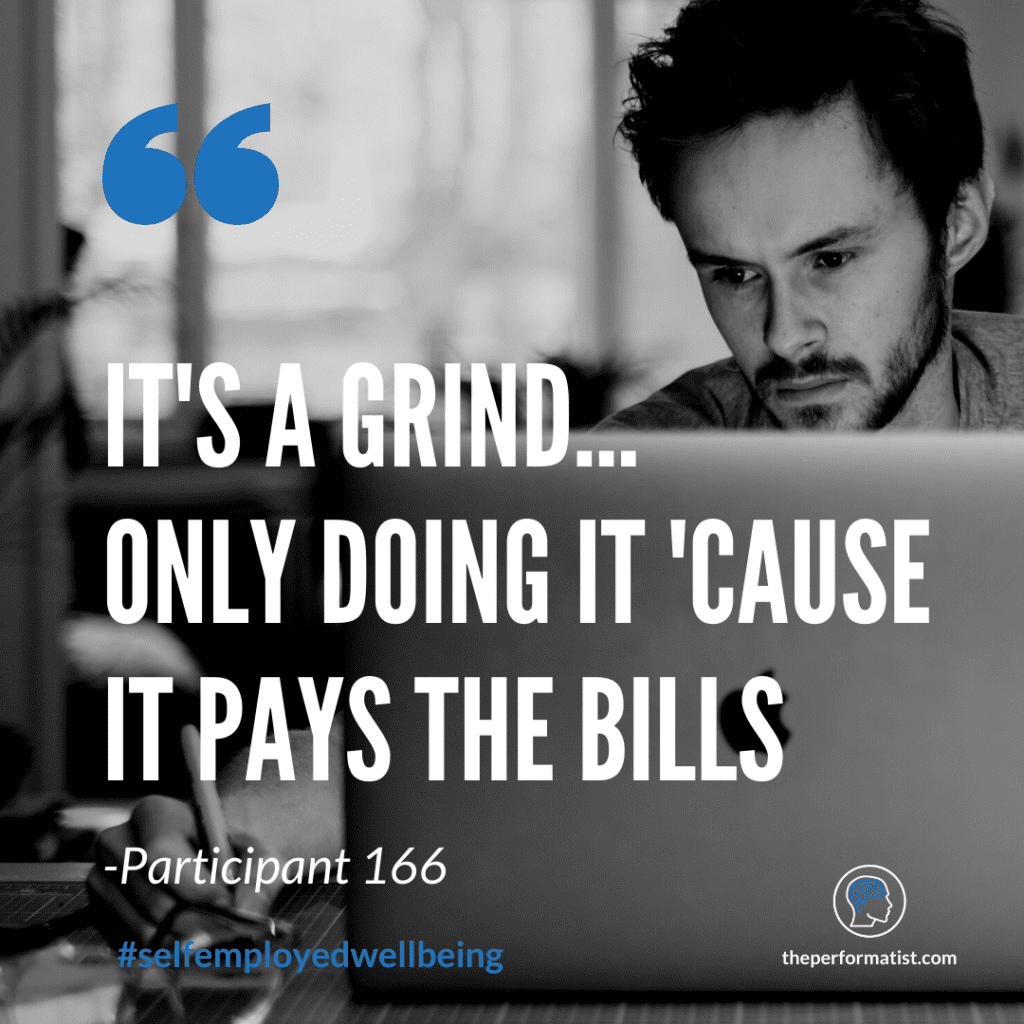Podcast: Play in new window | Download (Duration: 33:35 — 61.5MB)
Listen with your favourite player Apple Podcasts | Spotify | Amazon Music | RSS | Subscribe
Self-determination is an important concept when considering the human motivation to work and perform. Self-determination theory (SDT)1 explains human motivation, and according to Edward Deci, it is “the energy for action. It gets us up in the morning and moves us through the day”. Motivation allows us to make personal choices based on survival, integration, and work with others and allows us to feel we have control over the direction of our lives. In this article, we explore motivation to work from the perspective of self-determination theory and look at how internally generated motivation is healthier and more sustainable than externally generated motivation. In this sense, commanding our own work seems consistent with self-determination theory.
Self Determination and Working For Yourself
Many adult working people feel at odds with their work. I know this not only because I hear it in people's everyday language but because many of you told me directly. In a piece of research published this year2, a large portion of respondents had a negative relationship with their work. In fact, all of the groups I looked at were dissatisfied with work. And in an ad-hoc survey I've been running for about 18 months, 35% of respondents placed themselves at six or below on a 1 to 10 scale of happiness with work.
In the study I did with John Hyland, many individuals reported loving their work. They apparently wouldn't do anything else, even for pay. Some said they feel privileged to serve other people. But others were sick and tired of being undermined, undervalued, and disrespected. They felt neglected and unstimulated in their work, and these feelings were not reserved for those who were directly employed. Self-employed people were struggling too.




In our study, we didn't use Self-Determination Theory as a framework for understanding participants' relationships with work. However, taking its wide-reaching and proven application in understanding human motivation, It's worth considering here.
This site exists to promote the idea that every one of us can find and perform work that engages and fulfils us. We can become the active agent in command of our own work. We don't have to do work we hate. Work doesn't have to be a means to an end. Work is meant to give us meaning and purpose in life, and anything less than that is an insult to our very existence. You and I were not made to be cogs in the machine of commercial enterprise. We were not made to clock in and clock out and merely press widgets in the space between.
Self Determination Theory has caught hold of me in recent times, and I have become interested in how we can use it to explain the behaviour and motivation of self-employed. SDT is a theory of human motivation centred on the organism, the human being, and examines the social conditions that facilitate or hinder human flourishing. It offers us a means whereby we may examine ourselves and the energy that drives us to act. In doing so, we might make better decisions and ultimately find and perform the work that sustains us for a lifetime.
Introduction to Self Determination Theory
In pretty much all areas of our lives, we are concerned with motivation, the feeling and intention to move and act on something or not. Parents, bosses, managers, teachers and so on wonder how they can influence our behaviour towards ends they believe are valuable. We, in turn, struggle to find the energy and effort to persist in many of the tasks of everyday life. Making the gym, eating better, making more time for family and so on are important to us, but we fall short. Those who would wish to command our behaviour sugar the medicine and salt the oats, so to speak. They offer rewards or punishments and impose grades and evaluations to direct our actions. And through a lifetime of reward and punishment, our behaviour is influenced less by internal aspects and more by external.
As these external demands impose themselves on us, we are often more concerned with how others value us than how we value ourselves. But all the while, we are motivated internally, too, by interests, curiosity, and personal values. These intrinsic motivations are not always rewarded externally. Nevertheless, given the right environment, they can sustain our creativity and effort for years. Self-Determination Theory attempts to explain the dynamics of the interaction between these intrinsic and extrinsic forces at play within us.
Edward Deci suggests that psychologists, economists, and ordinary people have traditionally considered motivation a unitary concept. That is to say, they see motivation as something that differs only in the amount we have or do not have. Like coins in your pocket, you can have more or less motivation at your disposal, and how much you have determines your results. For the people who command our behaviour, such as parents, teachers, and bosses, we should have sufficient motivation for the task at hand or at least be able to conjure it. They forward a simplistic idea of motivation that suggests performing a task sufficiently merely requires us to muster the quantity of motivation necessary. And if we can't, as the behaviourist idea goes, we can be persuaded through influence and stimulation.
This quantitative idea of motivation is somewhat flawed, Deci suggests. It is not the quantity behaviour that is most important, he says; it is the quality. And we can't get to that by looking at motivation in quantitative terms.
What is this thing called motivation? It's the energy for action. It's what gets you up in the morning and what moves you through the day
Edward Deci Phd
Self-Determination of The Human Organism
Self-Determination Theory assumes that human beings are active organisms with evolved tendencies toward growth, mastery, and integration of new experiences into a coherent sense of self. These natural tendencies toward growth and development are automatic, however. The social context is an essential factor, and it can either support or thwart our development. And so, there exists a dialectic relationship between the organism and its social context. This is the basis for SDT’s predictions about human behaviour, experience, and development.
SDT speaks of psychological “nutriments” for healthy human development and functioning, and we realise these through the fulfilment of basic psychological needs for Autonomy, Competence, and Relatedness. To the extent that these psychological needs are satisfied on an ongoing basis, people develop and function along healthy lines. However, if these psychological needs are thwarted, people will more likely experience the absence of well-being and sub-optimal functioning.
The darker aspects of human behaviour, such as psychopathology, prejudice, and aggression, are understood as reactions to thwarting of basic psychological needs. In other words, where our basic psychological needs are not supported, we develop compensatory or defensive strategies. We literally have to fight for psychological survival. In overly controlling, rejecting, critical, and negative situations, we are more likely to become self-protecting, self-focused, defensive, aggressive, and antisocial.
Ryan and Deci's theory of self-determination refers to these basic psychological needs as proximal satisfactions and says that they are, in the most profound sense, the essence of human thriving. The research suggests that in all social contexts, be that work or play, where there is support for our satisfactions, we express our curiosity, creativity, productivity, and compassion for others to the highest levels.
Autonomy
We describe Autonomy as the human need to self-regulate our experiences and actions. Autonomy is human functioning associated with volition, congruence, and integration 3, however, it is not the same as independence or self-reliance. Instead, the hallmark of autonomy is that our behaviour is self-endorsed according to our genuine interests and values. It is in effect, that we are moved internally, and we are in control of our own lives.
Competence
Albert Bandura suggested that competence is a core aspect of human motivation 4. From Self Determination Theory's perspective, competence refers to our basic need to feel effective and masterful in a given discipline or field of work. However, competence is open to thwarting. Where we lack the skills for a given task, criticism is heavy, or our abilities are undermined, competence can easily wane.
Relatedness
Relatedness or Connection refers to our feelings of social connection. We find relatedness in communion with others in work, sport, community, religion or other social contexts. It is a feeling of being cared for and caring for others and is found in making a contribution towards an initiative that we consider larger than us.
SDT suggests that these three basic psychological needs of autonomy, competence, and relatedness are essential, not only for optimal motivation but also for well-being. Deci and Ryan argue that many forms of psychopathology have their roots in childhood deprivation of basic psychological needs. The authors argue that perfectionism in adulthood can be a compensatory mechanism for the absence of love through competence. Antisocial behaviour can be a reflection of a controlling and cold childhood starved of the need for relatedness.
Controlled Versus Autonomous Motivation
Controlled Motivation
A central teaching of Self Determination Theory is the difference between controlled motivation and autonomous motivation. Controlled motivation is a carrot-and-stick approach involving seduction, coercion, and manipulation of conditions and factors. You feel pressure to perform and act, which is usually accompanied by adverse stress and anxiety. No surprise, then, that these experiences have negative consequences for your performance and well-being. Ok, you might endure these conditions for a certain period, expecting the pressure to go away once you get this thing done. But in this scenario, we create expectations and set a precedent, so the cycle of reward and punishment persists. The results are usually chronic effects on our well-being.
Additionally, with controlled motivation, we tend to want to get the job done quickly, either to get away from it or towards the reward. So we cut corners. That makes sense. For certain aspects of personality, this situation is gratifying. People who are materially motivated and value applause over effort usually thrive in a results-driven environment but often at the expense of others. There are countless examples of this from the corporate world; Lee Iacocca and the Ford Pinto, Lord Browne and BP, 3M and the Teflon scandal, or Boeing's 737 Max. Our over-reliance on behaviourist reward and punishment methods of motivation has delivered us short-term material gains but at the expense of the long term.
Autonomous Motivation
When we are autonomously motivated, we experience complete volition, willingness and choice about what we are doing. Deci says that in the doing of the task or performance, we are endorsing the doing of it. There are two particular aspects to autonomous motivation. The first reflects our interest and enjoyment in the task and suggests that if we are interested in something and enjoy it, the motivation to do it is already present. In its purest form and in the absence of other influencing factors, there is no need for an external push. Children give us every example we need to demonstrate this. We don't need to motivate a three-year-old to play; they just do it. Driven by interest and curiosity and sustained by their enjoyment, they are self-motivated.
The second form of autonomous motivation concerns our deeply ingrained values and beliefs. For example, if there is something to which we hold great importance, being environmentally responsible, we will be more than willing to engage in behaviour that aligns with that. The motivation to act is already there, waiting to exercise itself. Both forms of autonomous motivation have an intrinsic source – they come from us easily without the need for external prompting. Hobbies fall into this bracket. Gardening, art, writing, storytelling, dancing, singing; we generally engage in these things for their own sake. Deci says that hundreds of research studies have shown that when we are autonomously motivated, we are more innovative and creative. You'll be better at solving problems and making decisions, and you will perform better at work. Additionally, your emotional state will be more positively oriented.
I think most of us really want to offer the world something of quality, something that the world will consider good or important. And, that's really the enemy, because it's not up to us whether what we do is any good. And if history has taught us anything, it is that the world is an extremely unreliable critic. The time of our life is so short, are we spending it doing what's important to us?
Ethan Hawke, Actor
How To Support Autonomy
Now that we understand the results for individuals and organisations are enhanced when people are autonomously motivated, it brings us to ask, how can we be more so? Edward Deci says that we must begin by considering their perspective. When we understand the internal framework of understanding of another, we can move forward in a mutually beneficial direction. Without that understanding, we are fighting for control, and motivation relies on the inferior carrot-and-stick approach. We might achieve short-term results, however, trust and respect suffer.
Understanding the other's perspective offers them a sense of choice, of being involved in the decision-making process. It supports their freedom to explore possible solutions and become self-starting. Instead of people being a means to an end, there become part of the process. Altogether, it is a human-to-human relationship rather than a human-to-machine one. When we respect other people's autonomy and provide them with a meaningful rationale for action 5, there is the opportunity for them to internalise it and make it part of their value system.
What Happens When Our Autonomy Is Supported?
When teachers are autonomously motivated, their students learn more profoundly and conceptually. Their students enjoy learning more than they do otherwise, and they are more confident in themselves.
When doctors and medical staff support their patients' autonomy, those patients recover better and live healthier lives. Feeling responsible for their health, patients take their medications more reliably and eat healthier diets. They exercise regularly too.
When sports coaches are more autonomy-supportive of their athletes, research shows their athletes are more inclined to increase their efforts and feel better about themselves. Research also found that athletes worked better together as a team.
In workplace settings, research shows that when bosses support staff autonomy, performance results improve, absenteeism and staff turnover reduce. There is very little SDT research in self-employment; however, it may be reasonable to suggest that intrinsic motivation is high amongst people working for themselves. Their need for Autonomy and Competency may be satisfied, but perhaps Relatedness suffers given the isolated nature of self-employment.
Deci says that although implicit hierarchical relationships exist in many of these situations, we also have peer relationships that operate on the same level. Unless our relationships serve our need for autonomy, Deci says, we won't have a relationship. His take-home message from thirty years of self-determination theory research is that we must not ask, “how do we motivate others”. Instead, we must ask, “how do we create the conditions where other people will motivate themselves”.
Deci's answer is Autonomy Support.
Reach Your Peak
Become a member of Peak Performer, a supportive community for organisational leaders, business owners, consultants and the self-employed that teaches you how to develop yourself, your people, and your organisation
The Six Mini-Theories of Self Determination Theory
SDT comprises six mini-theories, each developed to explain a set of motivationally based phenomena emerging from laboratory and field research. Each mini-theory, therefore, addresses one facet of motivation or personality functioning in a range of settings.
Cognitive Evaluation Theory (CET)
Cognitive Evaluation Theory concerns intrinsic motivation. This is motivation based on the satisfaction of working “for its own sake.” Prototypes of intrinsic motivation are children’s exploration and play, but intrinsic motivation is a lifelong creative wellspring. CET specifically addresses the effects of society on our intrinsic motivation, or how rewards, interpersonal controls, and ego involvements impact intrinsic motivation and personal interest. CET highlights the critical roles played by support for Competence and Autonomy in fostering intrinsic motivation, which is critical in education, arts, sport, and many other domains of work and play.
Organismic Integration Theory (OIT)
SDT's second mini-theory addresses extrinsic motivation in its various forms, with their properties, determinants, and consequences. Broadly speaking, extrinsic motivation is human behaviour that is instrumental—it aims toward outcomes extrinsic to the behaviour itself. Yet, there are distinct forms of instrumentality, which include external regulation, introjection, identification, and integration. The more internalised we make the extrinsic motivator, the more autonomous we will be when we perform the behaviour. OIT is also concerned with social contexts that enhance or restrict internalisation. In other words, what makes us resist, partially adopt, or deeply internalise values, goals, or belief systems? OIT particularly highlights support for Autonomy and Relatedness as critical to internalisation.
Causality Orientations Theory (COT)
The third mini-theory describes individual differences in our tendency toward certain environments and regulation of behaviour. COT describes and assesses three types of causality; autonomy orientation, where we act out of interest and value of what is occurring; the control orientation, where our focus is on rewards, gains, and approval; and the impersonal or amotivated orientation, characterised by our anxiety concerning competence.
Basic Psychological Needs Theory (BPNT)
Basic Psychological Needs Theory is SDT's fourth mini-theory and elaborates on the concept of evolved psychological needs and their relations to psychological health and well-being. BPNT argues that we can predict psychological well-being and optimal functioning on autonomy, competence, and relatedness. As such, situations that support or thwart these needs will impact wellness. The theory argues that all three needs are essential and that if any is thwarted, there will be cost.
Goal Contents Theory (GCT)
This fifth mini-theory grows out of the distinctions between intrinsic and extrinsic goals and their impact on motivation and wellness. GCT sees goals differentially affording basic need satisfactions and are thus differentially associated with well-being. Extrinsic goals such as financial success, appearance, and popularity/fame have been specifically contrasted with intrinsic goals such as community, close relationships, and personal growth, with the former more likely associated with lower wellness and greater ill-being.
Relatedness, which has to do with the development and maintenance of close personal relationships such as best friends and romantic partners, as well as belonging to groups, is one of the three basic psychological needs.
Relationships Motivation Theory (RMT)
The sixth mini-theory is concerned with relationships and posits that some amount of such interactions is not only desirable for most people but is, in fact, essential for their adjustment and well-being. Because the relationships provide the satisfaction of our need for relatedness. However, research shows that not only can we satisfy our need for relatedness in high-quality relationships, but also autonomy and, to a lesser degree, competence are also satisfied. Indeed, the highest quality personal relationships are ones in which each partner supports the autonomy, competence, and relatedness needs of the other.
If other people do not understand our behaviour-so what? Their request that we must only do what they understand is an attempt to dictate to us. If this is being ‘asocial’ or ‘irrational’ in their eyes, so be it. Mostly they resent our freedom and our courage to be ourselves. We owe nobody an explanation or an accounting, as long as our acts do not hurt or infringe on them.
Eric Fromm | Humanistic Psychologist
Controlling Your Own Work
Although we can't guarantee it, working for oneself can be a route to becoming an active agent in our own life and work. But before that can happen, there are certain aspects of being that must be formed in us. We must adopt a certain concept of self and relationship to the world around us that allows us to function fully. Controlling one's own work does not mean that life will be finally rosy and all the things that cause you grief will disappear. This is simply not the case. Instead, working for yourself will bring challenges that you have likely never experienced before. As such, resilience becomes a key aspect that we must develop.
Working for oneself is rarely consistent with hedonic measures of well-being. Our lives, in other words, are not filled with satisfied desires and positive feelings and the pursuit of this is foolish. Hedonism is a one-sided idea of life, and to pursue well-being in this form is, according to Aristotle6, “a vulgar ideal” making us slaves of our own desires. Instead, Aristotle suggested that we can find true happiness in our expression of human excellence and virtue – in the doing well of things worth doing.
So taking the work perspective, you might ask, what's the point of going headlong into the challenge of self-employment? Why take on more discomfort than what I feel in my current job? Well, it is a case of realising your own Autonomy – the feeling of being in control and having the power to decide the direction of your life regardless of the short-term challenges. Ryan and Deci7 suggests that happiness, in the hedonic sense, cannot fully explain well-being or the absence thereof. Self-determination Theory takes the view that we can best understand well-being through thriving or being fully functioning. This means understanding that no matter what work looks like, and no matter who we work for, we embrace the challenge of it regardless.
To do work that engages our full self and provides fulfilment rather than material gain is the first step in that process.
References
- Ryan, R. M., & Deci, E. L. (2017). Self-determination theory: Basic psychological needs in motivation, development, and wellness. New York: Guilford Publishing
- Maguire, L., & Hyland, J. (2022). Cross-sectional Analyses of Self-employed & Directly Employed Workers’ Job-specific Well-being In Creative and Corporate Workplaces. DBS Business Review, 4.
- Ryan, R. M. (1993). Autonomy, and the Self in Psychological Development. Developmental perspectives on motivation, 40, 1.
- Bandura, A. (1989). Human agency in social cognitive theory. American psychologist, 44(9), 1175.
- Ryan, R. M., & Deci, E. L. (2000). Self-determination theory and the facilitation of intrinsic motivation, social development, and well-being. American Psychologist, 55, 68-78.
- Ameriks, K., & Clarke, D. M. (2000). Aristotle: Nicomachean Ethics. Cambridge University Press.
- Ryan, R. M., Huta, V., & Deci, E. L. (2008). Living well: A self-determination theory perspective on eudaimonia. Journal of happiness studies, 9(1), 139-170.
SDT: A Contrarian Opinion
Although the metaphorical reality of need states and intrinsic and extrinsic motivation is accepted in personality psychology and allied disciplines such as social psychology and economics, in learning theory, it is not. Indeed, modern neurologically grounded learning or incentive motivation theory has long abandoned concepts of need or drive, and unified theories of reinforcement of reward reject the bifurcation of motivation into intrinsic/extrinsic, operant/respondent, voluntary/involuntary processes in favor of single process models which can explain all behavior without loss.
The position is epitomized by the research of the distinguished learning theorist and affective Kent Berridge of the University of Michigan, whose article on reward learning is linked below. Also linked below is my version of this article and its practical implications for a lay audience, reviewed and endorsed by Dr. Berridge in its preface. A precis of my argument is on pp. 57-63.
‘A Mouse’s Tale’ Incentive motivation theory for a lay audience from the perspective of modern affective neuroscience https://www.scribd.com/document/495438436/A-Mouse-s-Tale-a-practical-explanation-and-handbook-of-motivation-from-the-perspective-of-a-humble-creature
Berridge article on history of learning theory https://www.scribd.com/document/447163649/Berridge-Reward-Learning-Incentives-and-Expectations
Berridge Lab, University of Michigan https://sites.lsa.umich.edu/berridge-lab/